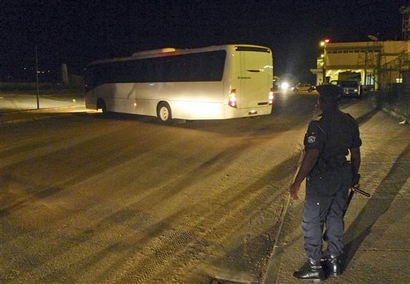2 separatists held in attack on Togo soccer team
Posted Tuesday, January 12, 2010 by AP

An Angolan policeman watches a bus carrying Togo's players to Cabinda airport, Angola, Sunday, Jan. 10, 2010.
CABINDA, Angola (AP)—Authorities have arrested two separatists in Angola’s restive Cabinda region following a shooting attack on the Togolese national soccer team that killed three people, a prosecutor announced.
According to Monday’s brief statement from Antonio Nito, the prosecutor in charge of Cabinda province, two unidentified members of the Front for the Liberation of the Enclave of Cabinda forces, or FLEC, were captured Sunday near the site of Friday’s shooting.
A FLEC leader reportedly in exile in France claimed responsibility Monday, but said his group had been targeting Angolan troops escorting the Togolese team.
“In war, anything can happen, this is only the beginning,” Rodrigues Mingas, who calls himself the group’s leader, told France-Info radio.
Another FLEC faction had denied responsibility, reflecting divisions in the separatist movement that both weaken it and complicate the task of finding a solution in the region, where unrest has simmered for a generation.
An organization that reunites former FLEC members who started a peace process with the Angolan government in 2006 said that the attack had likely been carried out by dissident FLEC members.
“This attack has been committed by armed gangsters who just want to sabotage the peace process,” said Andre Puango, coordinator of the Cabinda forum for dialogue.
Togo was to have played its opening game against Ghana on Monday in the African Cup of Nations tournament. But Togo’s players reluctantly left Angola late Sunday. They had said they wanted to compete to honor the dead, but their government dispatched the presidential plane after saying it was not safe to stay.
The Togolese team was driving to Angola to take part in the tournament when gunmen opened fire on the bus Friday. Togo’s assistant coach and team spokesman were killed, as was the Angolan bus driver.
Eight people were wounded, including a goalkeeper who was flown to South Africa for treatment. Doctors said Monday it was too soon to say whether Kodjovi “Dodji” Obilale will recover enough to play again, but they are optimistic. He was listed in good condition Monday, an improvement from serious a day earlier.
Meanwhile, three days of mourning were declared in Togo, where sobbing relatives met a plane late Sunday carrying the victims of the attack. Weeping women threw themselves to the ground and had to be helped up.
“Our boys went to Angola to celebrate the best in African football (soccer) but they came back with dead bodies and bullet wounds,” said Togbe Aklassou, a traditional ruler from the Be area of Lome.
Togo’s players had wanted to compete to honor the dead, but their government dispatched the presidential plane after saying it was not safe for them to stay.
“Despite the terrorist attack, Cabinda will remain a hosting city,” Angolan President Jose Eduardo dos Santos said in a speech at the opening ceremony before the Mali-Angola match. “There is no need to be afraid.”
Mingas, who calls himself FLEC’s leader, said Monday his group was behind the attack. But it was unclear what authority he wielded from exile.
A leader of a competing FLEC faction, Nzita Tiago, also claimed responsibility, speaking to the AP by phone from Paris. However, Portugal’s national news agency quoted the secretary-general of Tiago’s faction, Joel Batila, as saying it had nothing to do with the attack and blamed it on dissidents. Tiago said: “Batila may not be fully informed.”
Another FLEC faction leader, Tiburcio Tati Tchingobo, has denied responsibility, telling the AP the attacks resulted from frustration and perhaps lack of discipline among separatist forces.
Alex Vines, head of the Africa program at London’s Chatham House think tank, said Cabinda’s factions have been breaking into smaller and smaller cells in recent years. None has more than a few hundred fighters and their tactics are “hit-and-run, opportunistic attacks.”
“It’s very difficult to see what’s going on,” he said. “How (these groups) fit together is not clear at this time.”
As weak as Cabinda’s armed groups are, periodic announcements from the Angolan government that the uprising has been quelled—either by force or negotiations—have been followed by new outbreaks of violence.
In 2006, one FLEC faction signed a peace deal with Angola’s government. That faction’s leader, Bento Bembe, is now a Cabinet minister charged with overseeing human rights issues.
The Angolan government has denied charges from international human rights groups that its military has committed atrocities in Cabinda.
Angola has been struggling to climb back from decades of violence, and its government was banking on the tournament as a chance to show the world it was on the way to recovery.
Cabinda’s unrest is unrelated to—and often overshadowed by—a broader civil war that lasted nearly three decades and ended in 2002.
Associated Press Writers Ebow Godwin in Lome, Togo; Donna Bryson in Johannesburg; Barry Hatton in Lisbon, Portugal; and Jamey Keaten in Paris contributed to this report.
- Tag:
Photos
More»Eugenie Bouchard sends fans wild in barely-there bikini
Friday April 19 2024Paige Spiranac shows off underboob in new racy snap
Friday April 19 2024Ex-Barcelona WAG strips completely naked
Thursday April 18 2024



Your Say